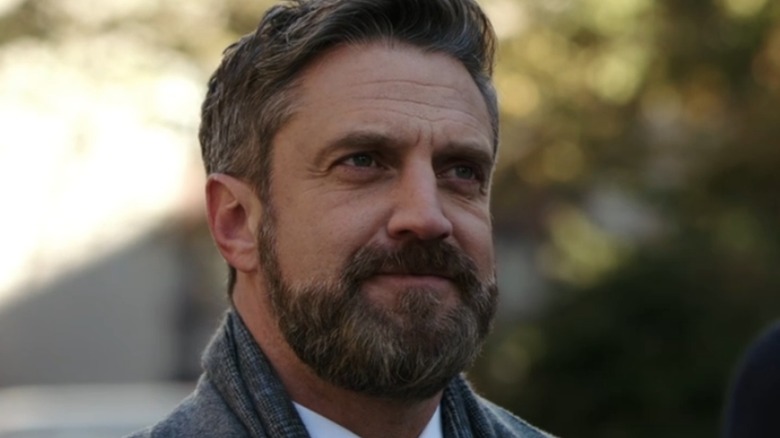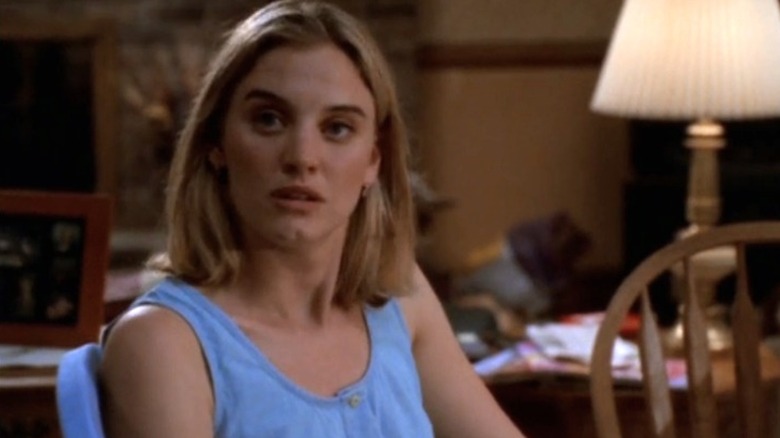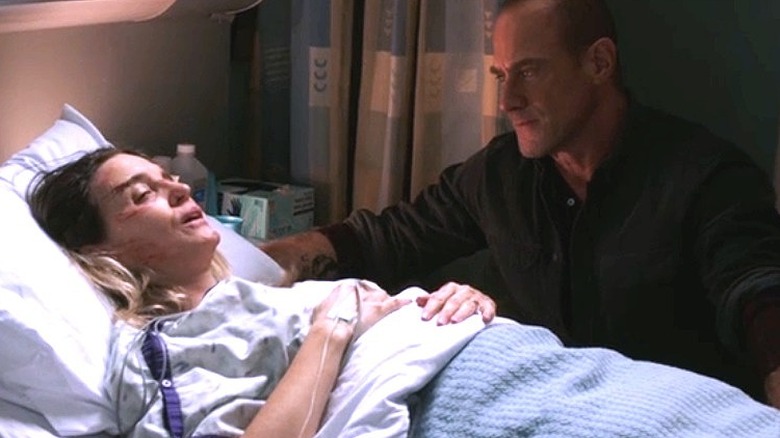The Law & Order: SVU Character Return That Had Fans Absolutely Livid
When Christopher Meloni's Detective Elliot Stabler left "Law & Order: Special Victims Unit" in 2011, fans were simultaneously baffled and distressed by his character's complete and unceremonious exit (via Reddit). It came as little surprise, then, when his return to the franchise in "Law & Order: Organized Crime" — and Meloni's crossover appearances on "Special Victims Unit" — proved a brilliant ratings move for both the long-running series and its brand-new spin-off (via Deadline).
However, while audience appreciation for the will-they-won't-they "Bensler" through-line has, historically, allowed for some acceptance of the hot-headed Stabler's cowboy bop behavior, any reboot of the character in 2021 would necessarily involve a kind of reckoning (via IndieWire), as well as storylines that prompt the problematic character to evolve. As long-time fans of "SVU" well-know, Stabler was at his most sympathetic when he slipped into the role of hardworking and devoted (if absentee) family man. Whether he was struggling to balance the victims' needs with the needs of his family, or fighting back feelings for his partner Olivia Benson (Mariska Hargitay), these personal threads provided the character with an invaluable degree of nuance and conflict.
Subsequently, it made sense to bring that family back in "Organized Crime," including (via "SVU" crossover) Stabler's long-suffering wife Kathy, portrayed by Isabel Gillies. Unfortunately for Gillies, many fans took their transparently motivated hatred for Benson's supposed rival out on the unsuspecting actor's feed in a number of absurd and abusive ways.
Isabel Gillies responded to Kathy haters
In October of 2021, the ubiquitous and vile fan hatred for the (extremely brief, mind you) return of Kathy Stabler — and the frequency with which fans felt it appropriate to take that hatred out on the actor's feed — prompted Gillies to pen an open response to the backlash on social media. In it, she shares some of the more venomous reactions she came across: "Gliding over links and threads," she writes,"...I started, well, crying. 'KATHY STABLER IS BURNING IN THE DEEPEST PART OF HELL'...'YOU DESERVE TO BLOW UP!'... 'Good morning to absolutely everyone except Kathy Stabler's ghost'..."
The crushing wave of, let's face it, woefully undeserved fury at the return of a character she portrayed (either in-season or in syndication), for well over two decades took its toll on the actor. "I caved and called my husband in tears [...] Then I called Mariska."
After revealing that Hargitay has also, she discovered, received her fair share of unwarranted hate, and that her former co-star helped convince her not to take it personally, Gillies' says her thoughts turned to the toxicity of social media in general, and the impact it has on others on a daily basis.
Gillies' plea to trolls goes beyond a TV series
After pleading with would-be keyboard evangelists and trolls to take a moment to reflect on (among other things) the honesty, necessity, and kindness of what they're typing before typing it, Gillies concludes her statement with a thought that reaches beyond her own experience with the aggressive "Special Victims Unit" fandom. "If a second-tier character on a primetime drama can be the victim of a ferocious online melt-down because of make-believe, it kills me to think what actual important civil servants must have to endure [...] Is it worth it?"
Before social media provided viewers with a public way to share their thoughts on a given character or storyline, the love or hate fans felt for such elements was a vital, but mostly harmless, part of the series' success. After all, if audiences don't have strong feelings about what they're watching, it likely means it's not compelling enough for them to continue to engage. But in an age of Twitter, Reddit, Facebook, et al, today's landscape is dramatically different, and more dangerous.
Unsurprisingly, the actor's response to the backlash caused a backlash of its own, from fans on Twitter who felt she was overreacting, since the hate was directed at her character, not her (they insist). Whether one agrees with this argument or not, it's safe to say that the hate-filled responses to fiction that more and more actors have had to endure in recent years has had real-world consequences.


